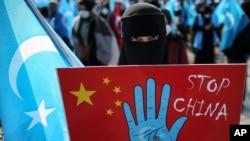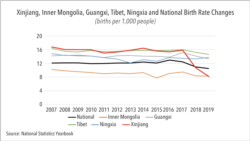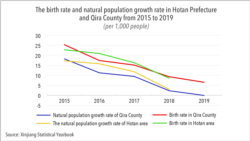New Chinese government statistics reveal the devastating consequences of what the United States and other countries have condemned as a genocidal campaign against the nation’s ethnic Uyghur population, mainly based in Xinjiang, the northwestern region of China.
According to the China Statistical Yearbook 2020, compiled by the National Bureau of Statistics, the birthrate in Xinjiang last year was only 8.14 births per 1,000 people. That is little more than half the figure for 2017, when the birthrate was 15.88 births per 1,000 people.
Xinjiang's natural population growth rate – which accounts for deaths as well as births – declined even more precipitously over the same period, from 11.4 per 1,000 in 2017 to 3.69 per 1,000 in 2019. That is a decline of more than 67%.
China's birthrate is falling across the country for a variety of reasons, but Xinjiang's decline is much greater than the national average. And there are signs that the decline was even more dramatic in some areas of Xinjiang, especially the south where Uyghurs are concentrated.
For example, in Hotan prefecture, where the Uyghurs make up about 97% of the population, the birthrate was 8.58 per 1,000 people in 2018. Before 2017, it was more than 20 births per 1,000 people.
Xinjiang birth policies
Chinese authorities attribute the decline to strict implementation of family planning policies with punishment for violations.
Under China's one-child policy for Han Chinese, which was completely abolished in 2016, Uyghurs and some other ethnic minorities were allowed to have larger families. Current regulations in Xinjiang restrict urban families to two children and agrarian families to three.
Those who have more children are required to pay a fee of three-to-eight times local per capita income of the preceding year.
While the law is now the same across China, it may be more onerous for Uyghurs who are accustomed to have larger families, a pattern that may have made authorities uneasy.
“It appears Chinese authorities had been concerned for some time about the relatively high growth of the ethnic minority population in relation to that of the Han population, even though the ethnic minority population still only makes up less than 9% of the PRC total population as a whole,” said professor Joanne Smith Finley, a China expert at Britain’s Newcastle University.
Finley said the ruling Communist Party is also concerned about continuing reluctance among young Han professional couples to have a second child.
“While the CCP is increasingly keen for more couples to have a second child to reverse the decline in the size of China's labor force and to redress the gender imbalance, it wants more Han children rather than ethnic minority children to shore up the Han-majoritarian state,” Finley said.
Accusations of genocide
China has built a vast system of reeducation camps targeting ethnic Uyghurs, which the United States and other countries have said amount to an act of genocide. Outside rights groups estimate more than a million people have been detained in them.
While China insists the camps provide education and training aimed at lifting people out of poverty, Finley is one of many observers who describe them as punitive internment camps.
“The knowledge that upwards of 1 million Uyghurs and other [ethnic minorities] are interned in these camps, in many cases because of bearing too many children, serves as a powerful disincentive to either have more children or to resist the state's coercive birth control policies,” she said.
“We have stacks of evidence that show couples exceeding birth limits are subject to incarceration, mainly in the form of ‘reeducation,’” said Tim Grose, associate professor of China Studies at Indiana's Rose-Hulman Institute of Technology.
Allegations of forced sterilizations
While China's official yearbook attributes declining birthrates to a cultural shift away from marriage and family, Ilshat Hassan Kokbor of the Uyghur American Association offers a simpler explanation -- forced sterilizations and abortions by the Chinese government.
According to an Associated Press investigation based on government statistics, state documents and interviews with 30 ex-detainees, family members and a former detention camp instructor, the state regularly subjects minority women to pregnancy checks, and forces intrauterine devices, sterilization and even abortion on hundreds of thousands of detainees, leading to what some experts call a campaign of “demographic genocide.”
The Communist Party “has also effectively mobilized ‘public health’ officials who have distributed and, in many cases, imposed birth control methods on women," Grose told VOA. "The party has also incentivized smaller families in some rural communities of southern Xinjiang by offering monetary rewards for couples who forego a third birth.”
In a response to a similar report by CNN last September, the Chinese government insisted that those who complied with the family planning policies did so voluntarily.
“People of all ethnic groups are free to choose whether or not to have contraception and how to practice it with no organization or individual intervening,” said an August 2020 article in China's state-run Global Times newspaper.
Statistical accuracy questioned
Yi Fuxian, a senior scientist at the University of Wisconsin-Madison and author of Big Country with an Empty Nest, said discrepancies within official Chinese statistic make it especially challenging to draw firm conclusions.
Data from the Xinjiang Statistical Yearbook, for example, shows the Uyghur population in the region in 2018 is 11.6786 million, while the analysis of population changes in Xinjiang published by Tianshannet, a Xinjiang government-run news website, states the number is 12.7184 million, a difference of more than 1 million people.
Yi said the region has also experienced urbanization, which can delay marriages, birthrates and people’s attitudes towards having children.
“On the other hand, education in Xinjiang has improved. The people’s attitudes towards fertility have changed, marriages have been delayed and urbanization rates have increased rapidly," said Yi. "The so-called 'concentration camps' as described by the West, what China calls reeducation camps, have led to separation of families, affecting fertility rate."
Regardless of the cause, results show an alarming decrease in Uyghur birth rates that critics say amounts to a slow-motion genocide.
Finley of Newcastle University said the overall policy suggests an intent to destroy foundations on which the Uyghur ethnic group is based.
“This is not a dramatic, sudden episode of mass killings; it is slow, progressive, creeping," she said.
"But it is nonetheless a genocidal act and process, which, taken together with the other policies of cultural erasure, will ensure a vastly depleted Uyghur population in numerical terms, and that only a hollow shell or husk of the Uyghur identity will remain.”






